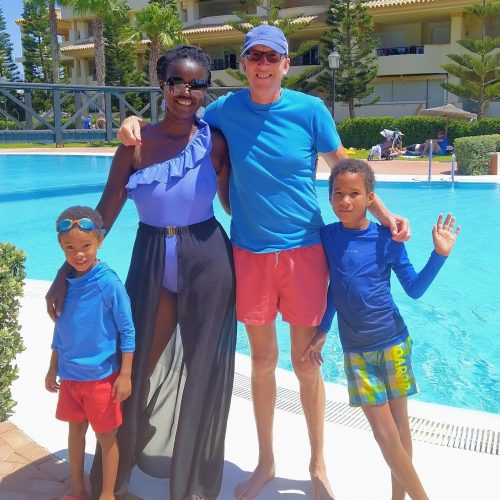
How Claudia Ended Up Living Abroad
Dear Krissy,
We all have our own life journeys and each of the paths we choose are going to be different from what someone else chooses. Here at Sincerely, Spain, we believe that this diversity adds to the richness that you discover when you meet different people in new situations. That is why we wanted to dive a bit deeper into our own stories. Today, we are sharing how Claudia ended up living abroad, and never going back to the place she once called home and later this month, Dani will share her story.
 Taking a Gap Year
Taking a Gap Year
The year I turned 18 my parents decided to move to Spain with my little brother, throwing a pretty big wrench in my life view of “normal.” I hadn’t wanted to move to Spain for my final year of high school because I wanted to finish with friends, in a place that I knew, but when I graduated, I decided to take a different path from the rest of my classmates. What started out as one gap year ended up being three (yes, three) whole years as a gap between high school and university. During those three years, I was taking advantage of other opportunities that were made available to me such as working as a nanny in Tarragona or living for six months in Brazil learning Portuguese.
Three years seems like a long time but I still think it was one of the best decisions that I could have made for myself. This time allowed me to develop as a person but also gave me time to improve my language skills to the point where I could communicate comfortably in Spanish and Portuguese. That is not to say there weren’t moments when I questioned this choice, but that, at the end of the day, going abroad at 18 has led me to be where I am now and I am very grateful for that.
 University Abroad in Spain
University Abroad in Spain
In the end, I decided to take Selectividad (although, it took me about four additional months to prepare for this entrance exam that used to exist for Spanish universities) and try to access the Spanish university system. I did this for multiple reasons, one main one being that my parents were still living abroad in Spain and another that school is much cheaper there than in the U.S. I also had the incredible advantage that my little brother had started his university classes the year before and was able to help me—and he helped a lot—sort out everything I needed to do.
At university, I studied sociology, something that I was interested in before leaving the States. In Spain this is a four year degree, mostly dedicated to theoretical classes, but with a short internship and some research thrown in. At the University of Granada, considered one of the top ten universities in Spain, I spent around $1,000/year, leading to a grand total of less than $5,000 for a four year degree and year-long masters. In addition, as a European student I also had the opportunity to do an Erasmus in Lisbon. In comparison to many American study abroad programs, Erasmus is funded by the European Union and every student who participates receives some sort of scholarship.
 The Ups and Downs of University Life
The Ups and Downs of University Life
I don’t want anyone to think that studying your entire degree abroad is a walk in the park and everyone should do it, so, let’s talk about the disadvantages. Firstly, it was hard. The language question is definitely one of the most difficult things that I had to tackle, mainly because from my first day at school, I had to take all my classes in Spanish. I would say I probably had a three month adaptation period before I was even able to efficiently understand what was going on, take notes, and participate in class discussion. In addition, it is tiring when you are living in another language and many days I would need a nap between class and doing my homework or studying.
Another disadvantage is that you are not only trying to deal with a difference of languages, but also differences in the school system. Most of the classes I took did not resemble what I remembered back home—from the way lectures are given to how exams are carried out varies. Memorization plays a big role in the Spanish school system and, as someone who didn’t spend that much time memorizing as a child, this was hard for me. This meant a lot of long lectures and sometimes your class notes were the only materials for an exam which, for someone brought up as a critical thinker, is frustrating.
The final disadvantage that sticks out in my mind is that it is hard to share your experience with others! This is something I have discussed with friends and acquaintances I know who have also decided to do a degree or masters abroad and it is something we all agree on—it no longer matters that you get all A’s, at some point just passing the class feels like getting the best grade. This means that only people who have shared a similar experience can truly understand what you are going through (and trust me, doing it for a semester or a year isn’t the same as the whole four years).
 There Have Been so Many Good Moments Though!
There Have Been so Many Good Moments Though!
On the other hand, the advantages have been extremely beneficial. There are some that are pretty obvious such as the fact that my Spanish is pretty darn good or that I have managed to make quite a lot of Spanish friends (something that it is not that common if you are only abroad for a short time). Both of these things have been a challenge and I wouldn’t say that my Spanish is anywhere near perfect or that all my friends are Spanish, but I would consider they are definitely things that I am thankful for.
In this sense, I feel like I probably have a double degree—Sociology and Spanish—with minors in cultural competences and maybe Portuguese. This might seem incredibly arrogant of me, but I figure studying a place and its language while living there and integrating yourself has to be equal to studying a society from afar. In addition, analyzing Spanish society within the discipline of Sociology gave me great perspective into how I had previously seen American culture.
I have also been able to take advantage of speaking fluent English to find different jobs even though the Spanish labor economy isn’t great. This means that I have integrated myself in different research projects, worked with international relations, was able to teach English classes, and regularly just had work in general. It might not seem like much, but it means that I have a decent CV, which is a lot for many young people in Spain where youth unemployment is pretty high.
 Moving on From Spain
Moving on From Spain
Everyday we make choices that affect our future, and deciding to study in Spain was one of the big ones for me. Even though it wasn’t easy, I wouldn’t change it, and I would definitely say that, personally, it was one of the best decisions I have made for myself. I can’t explain it exactly, and I am sure that all experiences are different (so don’t worry if it isn’t the choice for you), but it definitely worked out in my favor! However, a point came where I no longer wanted to stay in Spain any longer.
In 2018 with my job contract ending shortly at the beginning of 2019, I started looking for new opportunities outside of Spain. I decided to take an internship with a company in Helsinki, Finland and I am still here today. You might wonder why I didn’t go back to the U.S. or why I decided to continue abroad and I don’t have a proper answer for you. I guess, for me, for now, I have decided that I want to continue enjoying the adventure abroad. In fact, I don’t know if I will ever be able to go back and live in the States like a native any more because, as Dani shares in this article, I’ll never feel 100% American again.
I left the U.S. for a year in 2009 and it has obviously been much longer than that now, but I wouldn’t change any of the experiences I have had. I’ve had all sorts of good and not-so-good experiences, but life is like that no matter where you are. If you are considering going abroad or having an international experience and want to talk to someone about it, please feel free to reach out, trust us when we say we understand your feelings.
Wishing you all the best for your future adventures.
Sincerely,
Claudia




